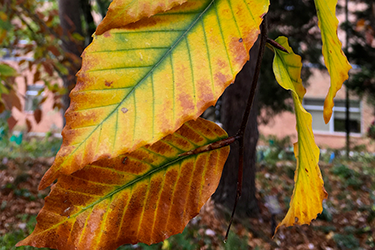| |
7:24 p.m. November 30, 2015
UT Gardens December 2015 Plant of the Month: American Beech
By Andy Pulte, pulte@utk.edu
 Now that the weather has changed, you can see the American beech from great distances through the forest with its smooth-flat grey bark and remnants of summer foliage. Image of fall foliage from an American beech by A. Pulte, courtesy UTIA.
Now that the weather has changed, you can see the American beech from great distances through the forest with its smooth-flat grey bark and remnants of summer foliage. Image of fall foliage from an American beech by A. Pulte, courtesy UTIA. |
|
| |
|
‘It’s not often a deciduous tree is chosen as a plant of the month during winter. However, as December dawns, one of the true climactic tree species of our Eastern forests takes center stage: American Beech (Fagus grandifolia). The darkness of the summer forest has now given way, and light filters through bare stems. From great distances you can see the American beech through the forest with its smooth-flat grey bark and wasted remnants of summer foliage. By all accounts, this is a joy-filled encounter when walking through the woods.
Pre-settlement, the Eastern United States was filled with giant trees and the American beech was one of the biggest. Some 300 years later, most of those trees are gone. I suspect that the first Europeans, having traveled from a nearly deforested continent would have stood, mouth agape at the sight of a beech rising over 100 feet high and just as wide. It was quickly found by settlers that if beeches were located, good soil must be present. I’m sure many great trees were felled in the name of the plow and progress.
As age sets in, a beech with a wide character will stretch its lower limbs out and then downward often touching the ground and setting roots where they touch. Additionally, root-suckers can form into fine specimen trees over time. I’ve been lucky on a few occasions to stumble on a concentric circle of beeches created from the secondary growth of a mother tree. It’s good to pause and think about the time it would have taken for this to happen – particularly if there is no longer a trace of the central-hub tree.
The beech with its smooth bark has been known throughout history as a young man’s tablet. If a pocketknife was handy, and a big enough beech was present, it was often scarred with exploits of love or huntsmanship. Most famous for this is Daniel Boone who allegedly commemorated successful bear hunts with such carvings.
In the home landscape a beech is rather difficult to transplant and has a reputation of not thriving in the urban environment. They prefer rich, well-drained soil in either sun or partial shade. Collecting seeds and directly sowing them outdoors, or transplanting very small seedlings may give the best chance to those wishing to have a beech in their landscape. However, perhaps it is best to protect the areas where native beeches grow to insure the next generation can enjoy their beauty.
You can find American beech throughout the region. There is a nice specimen in the Native American Interpretive Garden on the UT Institute of Agriculture campus in Knoxville. At the UT Gardens, Jackson, there is one just northwest of the main parking lot near the oak tree collection.
Andrew Pulte is a public horticulture specialist in the University of Tennessee Department of Plant Sciences. He works closely with the staff of the UT Gardens. The gardens includes plant collections located in Knoxville, Jackson and Crossville. Designated as the official botanical garden for the State of Tennessee, the collections are part of the UT Institute of Agriculture. The gardens’ mission is to foster appreciation, education and stewardship of plants through garden displays, educational programs and research trials. The gardens are open during all seasons and free to the public. For more information see the Gardens website: utgardens.tennessee.edu.
Published November 30, 2015
|

